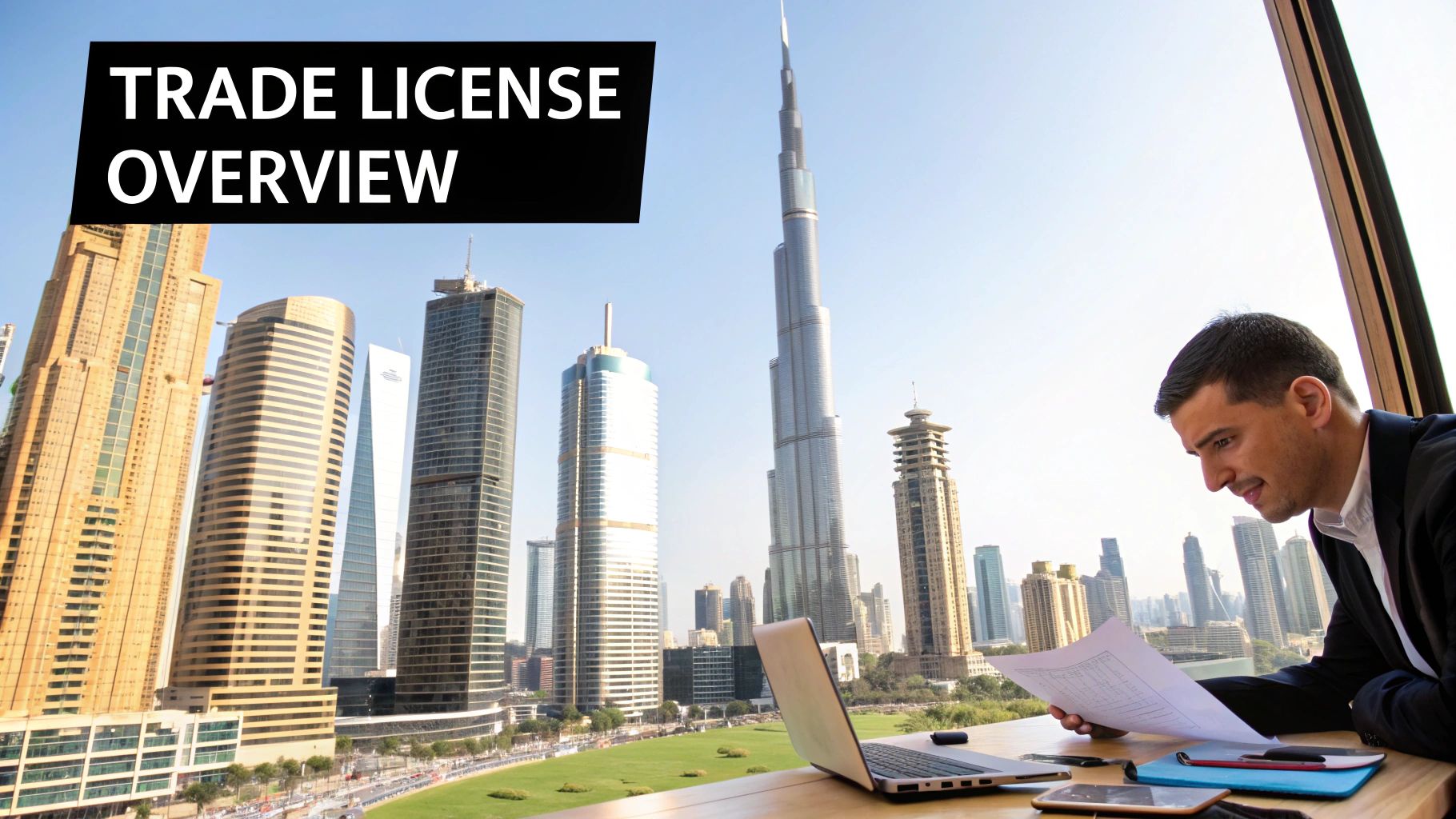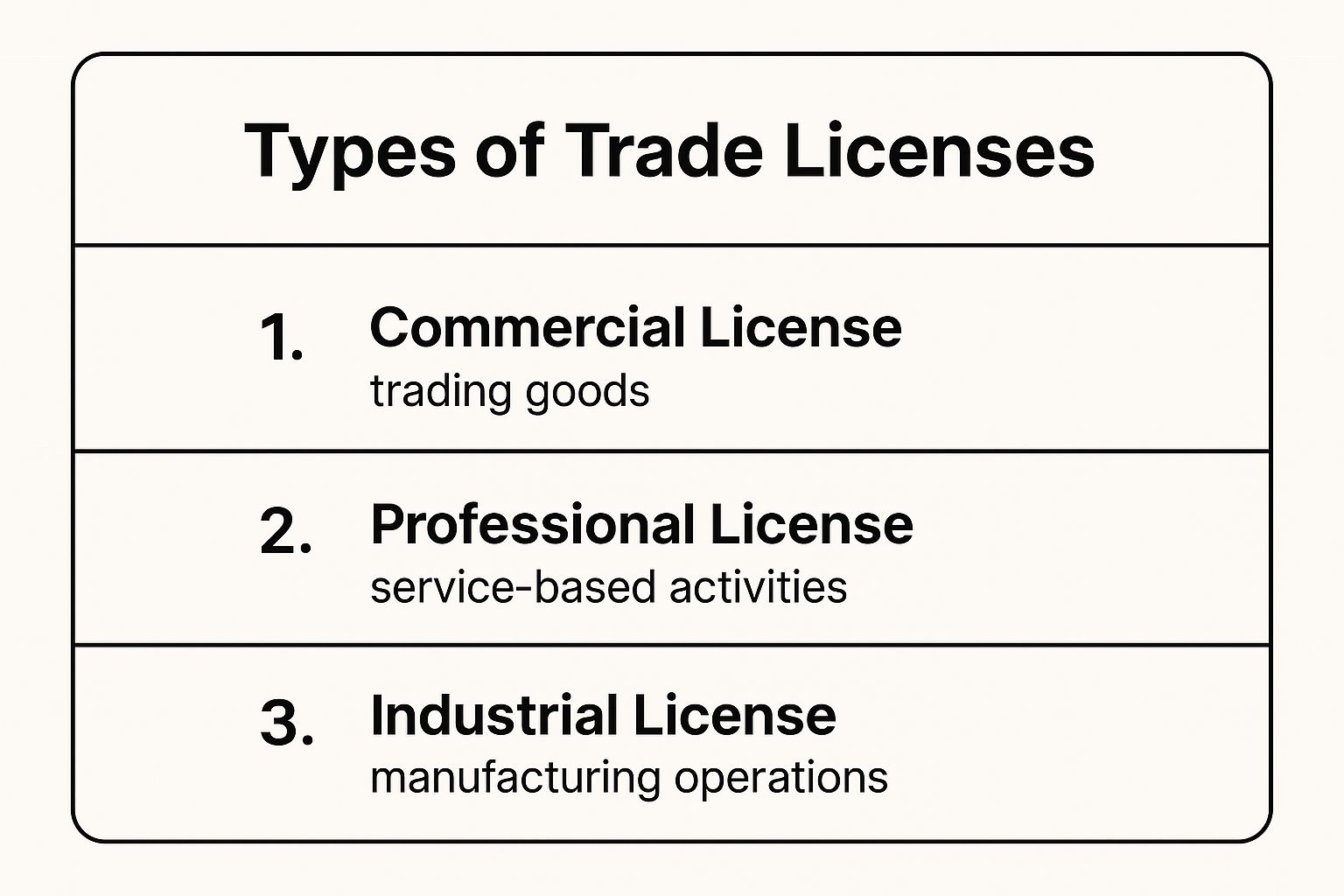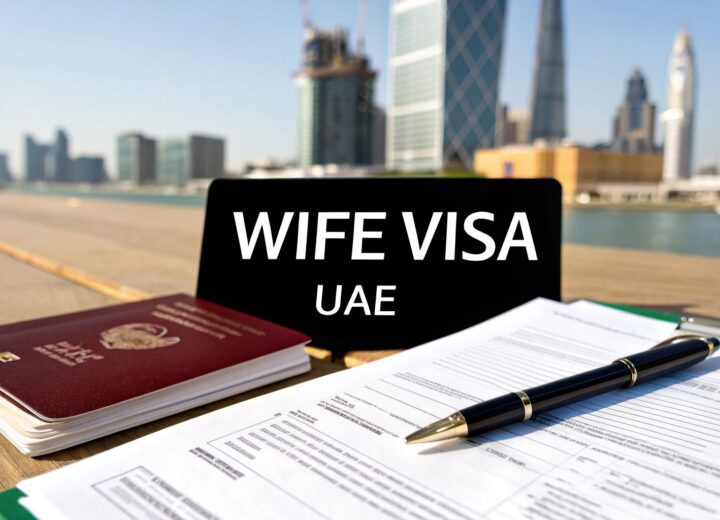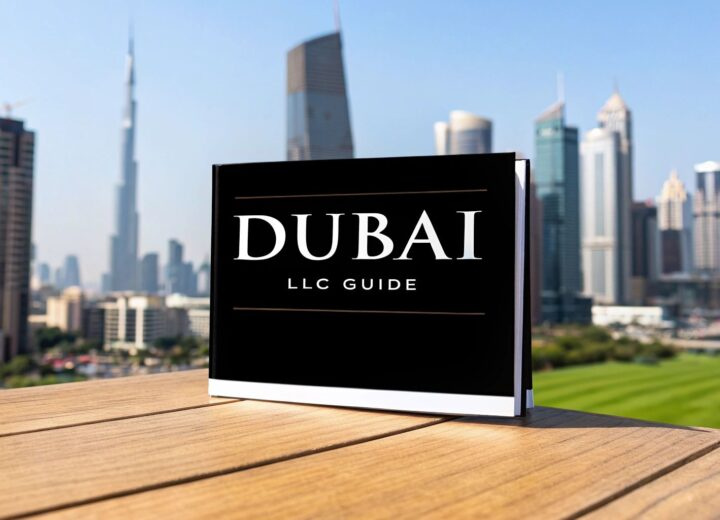Getting a trade license in Dubai is your first, most crucial step to legally setting up shop in the emirate. Think of it as your company's passport—it’s the official, non-negotiable document that proves the government has registered and authorised your business to perform specific commercial activities. Without it, your business simply has no legal standing in the UAE.
What Exactly Is a Dubai Trade License

A trade license is far more than just paperwork; it’s the legal foundation that makes your business a legitimate player in Dubai's energetic economy. Issued by the Department of Economy and Tourism (DET), this document is what officially turns your business idea into a recognised legal entity, giving you the right to trade, offer services, or manufacture products.
This license is also your proof to clients, partners, and banks that your company operates by the book, following all local rules and standards. It’s absolutely essential for opening a corporate bank account, signing an office lease, and securing visas for you and your staff. For any entrepreneur, getting to grips with what a trade license does is the real first step to unlocking the massive opportunities waiting in the UAE market.
Core Concepts You Need to Know
Before you jump into the application, there are a few key ideas you need to understand. These initial choices will define everything about your business setup journey, from the scope of your operations to your ownership structure and the regulations you’ll need to follow.
Your biggest decision right out of the gate is whether to set up on the Dubai Mainland or in a Free Zone.
- Mainland License: This is your ticket to trade directly across the entire UAE market without any barriers. It’s the perfect choice if you're aiming to work with local consumers or other companies based in the UAE.
- Free Zone License: Best suited for international trade, this option often comes with perks like 100% foreign ownership and tax exemptions. The trade-off is that your business activities are generally limited to within that specific free zone or outside the UAE.
Next, you need to pick the right license type, which is tied directly to what your business actually does. The three main categories are:
- Commercial License: For any business involved in buying and selling goods, like retail shops, import/export operations, or general trading companies.
- Professional License: This one is for service-based businesses and skilled professionals—think consultants, designers, artisans, and IT specialists.
- Industrial License: If your company is involved in manufacturing, processing, or any kind of industrial production, this is the license you'll need.
A trade license is the first legal document that greenlights your business, but it's usually issued with other important paperwork. To get the full picture, you can read our guide on the certificate of incorporation in the UAE.
Dubai's Pro-Business Reforms
The Dubai government is always looking for ways to make life easier for entrepreneurs by simplifying the setup process. As part of its ambitious D33 agenda to double the economy's size by 2033, Dubai recently rolled out major trade license reforms. These changes have sped up approvals, cut down on costs, and broadened the range of activities allowed under a single license, making it simpler than ever to get a new venture off the ground.
This pro-business environment is clearly working. The Dubai Chamber of Commerce registered 35,500 new businesses in the first half of a recent year alone, helping drive a steady 4% year-on-year GDP growth.
Choosing Your Business Jurisdiction: Mainland vs. Free Zone
One of the biggest decisions you'll make when getting a trade license in Dubai is choosing where your business will legally operate. This choice—between a Mainland, Free Zone, or even an Offshore setup—will shape everything from your company's ownership structure to who you can do business with.
Each option serves a very different purpose, so understanding the distinctions is critical to matching your business model with your long-term ambitions.
Think of it this way: a Mainland license is like opening a shop on a busy high street. You have complete freedom to trade with anyone and everyone across the UAE. This makes it the go-to choice for businesses that want a strong local footprint, like cafes, retail stores, or any service provider targeting the domestic market.
A Free Zone license, on the other hand, is like setting up your base in a massive international shipping port. Your focus is primarily on global trade. You get incredible benefits like 100% foreign ownership, tax exemptions, and simpler customs processes, which is perfect for import/export companies, international consultancies, and tech firms with a global client base.
The image below gives a neat overview of the main license types you'll encounter, which apply across these jurisdictions depending on what your business actually does.

This visual makes it clear: whether you land on Mainland or a Free Zone, your core activity—be it trading, professional services, or manufacturing—is what really determines the category of license you'll need.
Dubai Mainland Explained
A Mainland company, registered with the Department of Economy and Tourism (DET), gives you the most operational freedom inside the UAE. While it used to require a local sponsor, recent legal changes now allow for 100% foreign ownership for most commercial and industrial activities. This shift has made the Mainland a much more appealing option for international entrepreneurs.
Key benefits of setting up on the Mainland include:
- Unrestricted Market Access: You can trade directly with any customer or business anywhere in the UAE.
- Government Contracts: Mainland companies are eligible to bid on lucrative government projects and tenders.
- Flexible Office Locations: You have the freedom to rent an office or retail space anywhere you like in Dubai.
This is really the default choice for any business that needs a physical presence and direct interaction with the local market.
The Power of UAE Free Zones
Dubai has more than 40 specialised Free Zones, each tailored to specific industries like tech, media, finance, and logistics. These zones operate under their own independent authorities, which makes the setup process much simpler and offers a host of compelling incentives for foreign investors.
Free Zones are powerful economic hubs built to attract foreign investment. They offer a simplified, business-friendly regulatory world, which has been instrumental in positioning Dubai as a global centre for international trade.
The major advantages of getting a Free Zone license are hard to ignore:
- Complete Foreign Ownership: You keep 100% control of your business without needing a local partner.
- Tax Benefits: You can enjoy exemptions from both corporate and personal income taxes.
- Full Repatriation of Profits: You are free to send all your capital and profits back to your home country.
- Streamlined Setup: The licensing and visa processes are typically faster and more straightforward.
If you want to dive deeper into the specific perks and processes, our detailed guide on Free Zone business setup in Dubai is a great resource.
A Quick Word on Offshore Companies
An Offshore company, sometimes called an International Business Company (IBC), is a bit different. It's a legal entity set up in the UAE, but it’s not allowed to do business within the country.
Its main purpose is for things like international asset management, holding property, or making global trade easier. Think of it as a strategic tool for managing wealth and optimising tax, rather than for day-to-day local operations.
Mainland vs. Free Zone vs. Offshore: A Quick Comparison
To help you see the differences at a glance, we've put together a simple comparison table. This breaks down the fundamentals of each jurisdiction to help you figure out which is the right fit for your company.
| Feature | Dubai Mainland | Dubai Free Zone | Dubai Offshore |
|---|---|---|---|
| Business Scope | Can trade anywhere in the UAE and internationally | Can trade within the Free Zone and internationally | Cannot trade within the UAE; only internationally |
| Ownership | 100% foreign ownership for most activities | 100% foreign ownership guaranteed | 100% foreign ownership guaranteed |
| Office Requirement | Mandatory physical office space required | Options for physical offices or flexible desks | No physical office required; only a registered agent |
| Visa Eligibility | Eligible for employee and investor visas | Eligible, but visa quota may depend on office size | No visa eligibility for owners or employees |
| Taxation | Subject to 9% corporate tax on profits over AED 375,000 | 0% corporate and personal income tax | Generally exempt from all local taxes |
| Best For | Businesses targeting the local UAE market | International trade, export/import, global services | Asset holding, wealth management, international invoicing |
By carefully weighing these factors against your business plan, you can confidently pick the jurisdiction that will give your company the strongest foundation for success here in Dubai.
Your Step-By-Step Path to a Dubai Trade License
Getting your trade license in Dubai can feel like a huge task, but it’s really just a series of logical steps. If you break it down, the whole process becomes much clearer and far less intimidating.
Think of it less like a single mountain to climb and more like a set of manageable milestones. By focusing on one step at a time, from initial decisions to the final paperwork, you can navigate the system smoothly and sidestep common hold-ups.
Let's walk through exactly what you need to do to make your Dubai business official.
Step 1: Define Your Business Activities
First things first: you need to be crystal clear about what your business will actually do. This is the absolute foundation of your application. The activities you list will directly decide whether you need a Commercial, Professional, or Industrial licence.
The Department of Economy and Tourism (DET) has an official list of over 2,000 approved business activities, and you have to pick yours from this menu.
Vagueness is your enemy here. For example, instead of just putting "IT Services," you'll need to be more specific, like "IT Infrastructure Consultancy" or "Software Development." Getting this wrong can get your application rejected or cause problems for you down the line.
Step 2: Reserve Your Company Trade Name
Your company's name is its identity, and Dubai has strict rules about it. The name has to be unique, and you can't use any offensive words or make references to religion or government bodies.
Once you have a few names you like, you'll submit them for approval. This is done through the DET for a mainland company or the specific free zone's authority. This step basically puts a hold on your name so no one else can take it while you sort out the rest of your paperwork.
A strong, compliant trade name is more than just a legal requirement; it’s a foundational branding element. It should reflect your business's values and be easily recognisable to your target audience.
Step 3: Secure Initial Approval
The Initial Approval Certificate (IAC) is essentially a "no-objection" from the UAE authorities. It’s their way of saying they’re okay with you setting up your business. This is a crucial checkpoint before you start spending money on legal documents or rent.
To get the IAC, you’ll submit basic documents like passport copies for all the shareholders and the main application form. This certificate is your green light to move on to the more serious steps. For those just starting out, getting guidance from startup consultants can be a massive help in navigating these early stages efficiently.
Step 4: Prepare Legal Documents and Find an Office
With your initial approval secured, it's time to get the legal side of your business in order.
-
Memorandum of Association (MoA): This document is a must, especially for LLCs. It details the company's purpose, share capital, who owns what percentage, and the duties of each partner. It needs to be professionally drafted, signed by all shareholders, and notarised.
-
Office Space and Ejari: Almost every mainland business in Dubai needs a physical address. You’ll need to sign a tenancy contract for an office and then register it with the Ejari system. This registration gives you a unique Ejari certificate, which is mandatory for your final application.
Step 5: Submit Your Final Application
You're at the finish line. Now you'll gather everything you've prepared and submit it all to the relevant authority. This final package usually includes:
- The completed application form
- Your Initial Approval Certificate (IAC)
- The approved trade name certificate
- Passport copies of all shareholders and managers
- The notarised Memorandum of Association (MoA)
- Your tenancy contract and Ejari certificate
- Any extra approvals needed for specific activities (like from the Health Authority or Municipality)
Once your submission is reviewed and approved, you'll get a payment voucher for the licence fees. Pay that, and your official trade license in Dubai will be issued. Congratulations, you’re officially in business
Understanding the Costs and Required Documents

This is the part of getting a trade license in Dubai where a lot of entrepreneurs start to feel the heat. It’s all about the money and the mountain of paperwork. But if you get a clear picture of what you need and what it’s going to cost right from the start, you can avoid any nasty surprises down the line. A little prep work here goes a long way.
Think of it like planning a big trip. Your documents are your passport and visas, and the fees are your travel budget. You can't leave home without either of them being in perfect order. So, let’s unpack exactly what you need to have in hand and how much you should plan to spend.
Your Essential Document Checklist
Before you even get your wallet out, you have to get your paperwork sorted. Having this stack of documents ready to go will make the whole application process a lot faster. The list might change slightly depending on whether you're setting up on the Mainland or in a Free Zone, but these are the basics everyone needs.
- Completed Application Form: This is the official starting point, either from the Department of Economy and Tourism (DET) for a Mainland company or from the specific Free Zone authority you've chosen.
- Passport Copies for All Shareholders: You'll need clear, valid copies of the passports for every single owner or partner in the business. No exceptions.
- Initial Approval Certificate (IAC): This is the green light we talked about earlier, giving you permission to move forward with the rest of the application.
- Notarised Memorandum of Association (MoA): This is a critical legal document that spells out how your company is structured. It needs to be signed by all shareholders and then officially notarised to be valid.
- Trade Name Reservation Certificate: This proves your chosen business name has been approved and is officially yours.
- Tenancy Contract (Ejari): For Mainland businesses, this is non-negotiable. It’s the registered lease for your physical office space, proving you have a legitimate place of business.
Getting these documents in order is your first major hurdle cleared on the way to getting your trade license in Dubai.
Breaking Down the Costs
Getting a handle on the costs is absolutely crucial for budgeting properly. It isn't just one single payment; the total is a mix of one-time setup fees and other costs that you'll pay every year. For an even more detailed look, you can check out our guide on the trade license cost in Dubai.
One-Time Setup Fees:
These are the upfront costs you'll pay just once to get your business off the ground.
- Initial Approval Fee
- Trade Name Reservation Fee
- Notarisation of Legal Documents (like the MoA)
- Government Service Fees (Tasheel, etc.)
- Establishment Card Issuance
Annual Recurring Costs:
These are the expenses you need to factor into your budget every single year to keep your license valid and your business running legally.
- Trade License Fee: This is the main annual fee. The exact amount will depend on your specific business activity and company structure.
- Office Rent: This is often a major yearly expense, particularly for Mainland companies that must have a physical office.
- Sponsorship Fees (if applicable): While 100% foreign ownership has made this less common, some professional licenses might still need a Local Service Agent, which comes with a fee.
- Establishment Card Renewal: This card is essential for handling employee visas, and you'll need to renew it annually.
The numbers show that Dubai is a hotbed for new businesses. The UAE recently crossed the one million active business licenses mark, with Dubai alone accounting for 460,000 of them. This represents a 5% jump from the year before, fuelled by forward-thinking policies like 100% foreign ownership.
By carefully separating your one-time setup costs from your annual recurring expenses, you can build a solid financial plan for your first year and beyond. This is the key to starting your business on a strong financial footing.
Keeping Your Licence Up-to-Date: Renewals and Changes
Getting your trade licence in Dubai is a massive achievement, but it's really just the starting line. The real marathon is keeping your business legally sound, and that means staying on top of annual renewals and making any necessary updates along the way.
Think of your licence less like a one-time purchase and more like an active subscription. You have to keep it current to operate legally and sidestep some pretty hefty penalties. This isn't just admin work; it's a core responsibility for any business owner in the emirate. If you fall behind, you could be looking at fines, a frozen corporate bank account, or even getting your company blacklisted. Staying organised is key to keeping your doors open and your operations running smoothly.
The Annual Renewal Process
Renewing your trade licence is a yearly must-do. The good news is that it's usually a straightforward affair, as long as you have your paperwork in order. The trick is to start early—give yourself about a month before the expiry date to avoid any last-minute panic.
Here are the main documents you'll need to pull together for the renewal:
- A copy of your current trade licence.
- A valid Ejari registration certificate (your tenancy contract). The authorities need proof that you still have a legitimate, registered office space.
- Passport copies of all partners in the business.
With these documents ready, the renewal application goes to the Department of Economy and Tourism (DET) or your specific free zone authority. Once it's approved and you've paid the renewal fees, your updated licence will be issued, and you're good to go for another year.
"A delayed renewal isn't just a simple slip-up; it's a direct threat to your business's ability to operate. Keeping on top of your licence ensures you stay in good standing with the authorities, which is absolutely fundamental to building a lasting business in the UAE."
Making Changes to Your Business Licence
Businesses don't stand still—they grow, pivot, and evolve. Your trade licence needs to keep up. Any major change to your company's setup or what it does requires an official amendment to your licence. Trying to operate outside the lines of your current licence is a serious compliance issue.
Some common reasons you might need to amend your licence include:
- Changing a business activity: Maybe you're adding a new service or dropping an old one.
- Adding or removing a partner: Any shift in the ownership structure needs to be documented.
- Changing your company name: If you rebrand, the legal name has to follow suit.
- Moving your office: Your licence is tied to your registered address, so a new location means a new update.
Each of these changes has its own application process and requires specific supporting documents. For example, if you're changing partners, you'll need a notarised addendum to your Memorandum of Association (MoA).
Why Professional PRO Services Make Sense
Let's be honest, managing renewals and amendments can be a real headache. It's time-consuming administrative work that pulls you away from what you do best—running your business. This is exactly where professional Corporate PRO Services can be a game-changer.
A dedicated PRO team can take care of every little detail of your licence management. They make sure deadlines are hit, paperwork is filed correctly, and everything stays compliant. They act as your representative, dealing directly with government departments to make the whole process faster and free of costly mistakes.
Common Mistakes to Avoid During Your Application
Getting your trade license in Dubai can be a smooth ride, but a few common slip-ups can lead to frustrating delays and surprise costs. Think of this as some insider knowledge to help you sidestep the typical hurdles that trip up new entrepreneurs. Learning from these frequent missteps is your best bet for a hassle-free process.
One of the biggest mistakes you can make is choosing the wrong business activities right at the start. This isn't a small error; it can have long-lasting consequences because your license strictly limits you to the activities you've listed. Picking an activity that’s too vague or doesn't quite match what your business actually does can get your application rejected or force you to amend it later, costing you both time and money.
Miscalculating the Total Costs
Another common trap is underestimating the true cost of setting up shop. The final bill is always more than just the license fee. Many new business owners forget to factor in the additional expenses that can quickly pile up.
To put together a realistic budget, you absolutely have to account for:
- Initial Approval and Trade Name Fees: These are the first government charges you'll face before you can even submit your main application.
- Office Rent and Ejari: A physical office is a must for mainland setups, and this is often a major annual expense.
- Notarisation and Document Attestation: Legal documents, like your Memorandum of Association, need to be officially attested, and that comes with a fee.
- Establishment Card and Visa Costs: These are critical for hiring staff and for your own residency in the UAE.
Ignoring these costs can put a serious financial strain on your business right when you need capital the most. A detailed financial plan isn't just a good idea—it's non-negotiable.
Submitting Incomplete or Incorrect Paperwork
Even a tiny mistake on your documents can bring your entire application to a screeching halt. The authorities have very strict requirements, so incomplete forms, wrong information, or a missing signature will lead to an immediate rejection. This is where getting professional guidance really pays off.
A rejected application isn't just a simple setback; it's a loss of momentum right when you're trying to build it. Making sure every single document is perfectly prepared and submitted correctly the first time is the secret to getting your trade license without pointless delays.
Working with specialists in Mainland and Freezone company formation can take these risks off your plate. Experts will ensure your application is flawless, handle all the submissions, and communicate with government departments for you. This kind of support turns a potentially stressful process into a seamless one, letting you focus on what really matters: launching your business. With 24/7 support and cost-effective solutions available, you can avoid these common mistakes and secure your trade license in Dubai with confidence.
Frequently Asked questions About Dubai Trade Licenses
Setting up a business in Dubai naturally comes with a lot of questions. We get it. To help clear things up, here are some straightforward answers to the queries we hear most often from entrepreneurs just like you.
Can I Get a License Without a Physical Office?
This is a big one, and the answer really boils down to where you decide to set up. If you're going for a Mainland license, having a physical, registered office with a valid tenancy contract (known as an Ejari) is almost always mandatory. It's a non-negotiable for the Department of Economy and Tourism (DET).
On the other hand, many Free Zones are built for flexibility. They often let you use a "flexi-desk" or a spot in a co-working space. This setup satisfies the official address requirement without locking you into a pricey, full-time office lease. It's a massive advantage for startups, consultants, and international businesses that don’t need a big physical presence.
How Long Does the Licensing Process Take?
The timeline can vary quite a bit. A Mainland company setup generally takes longer, anywhere from one to four weeks. This is because it involves more moving parts, like finding that office space and getting approvals from different government departments.
Free Zone setups are famous for their speed. Since a single authority handles everything, you can often get your license sorted in just a few days to two weeks. This efficiency is a huge plus for anyone eager to get their business off the ground quickly. The UAE’s business-friendly approach is working, too—the number of active commercial licenses has soared past 1.5 million nationwide, a testament to how streamlined these processes have become.
What Is the Difference Between Commercial and Professional Licenses?
The main distinction comes down to what your business actually does.
- A Commercial License is for businesses centred on trading—buying and selling goods. Think retail shops, import/export firms, or general trading companies.
- A Professional License is for service-based businesses that rely on an individual's specific skills or expertise. This includes consultants, designers, accountants, and other skilled artisans.
Ownership structure is another key difference. While today you can get 100% foreign ownership for most commercial activities on the Mainland, some professional licenses still need a UAE national to act as a Local Service Agent (LSA). An LSA doesn’t own any shares in your company; they are simply paid an annual fee for their role.
Getting your license is just the first step. To truly succeed, you'll need a solid plan to grow your business and reach your customers. You can explore some comprehensive business marketing and growth strategies to get started.
Navigating the nuances of setting up a business in the UAE can be complex, but you don't have to do it alone. At PRO Desk, we simplify the entire process for you.
✅ Specialists in Mainland Company Formation in Dubai, Sharjah & Abu Dhabi
✅ Specialists in Freezone Company Formation across the UAE
✅ Specialists in Golden Visa on Property and Investor Visa
✅ Specialists in Corporate PRO Services and Attestation Services
✅ 24/7 Support Service – Always here when you need us
✅ Cost-Effective Business Setup Solutions tailored to your needs
✅ Enjoy UAE Tax Benefits for International Entrepreneurs
📞 Call Us Now: +971-54-4710034
💬 WhatsApp Us Today for a Free Consultation at https://prodesk.ae





